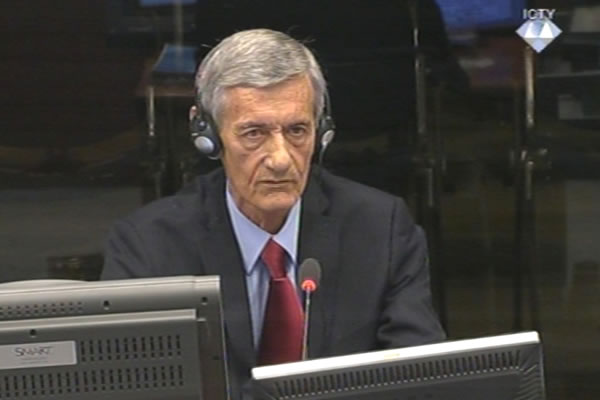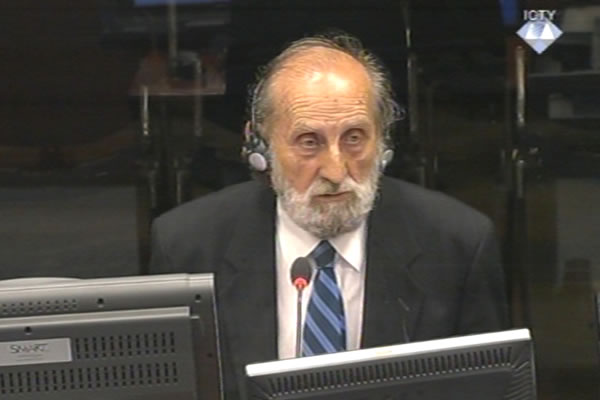Home
EXPERT WITNESS DENIES CRIMES IN BH
Radovan Karadzic’s defense expert concluded in his report that the citizens of Sarajevo weren’t terrorized but that they were victims of ‘various circumstances’. The civilians from Srebrenica weren’t deported and the ‘allusions’ to mass executions of prisoners never reached the accused. Before the defense expert took the stand, Karadzic called his namesake and cousin. According to the witness, the events in Srebrenica were surrounded by a cloud of ‘mystification’ orchestrated by the Muslims, foreign media and some ‘Serbs from Belgrade’, like Vesna Pesic, Borka Pavicevic and Mira Markovic
 Radovan Radinovic, defence witness of Radovan Karadzic
Radovan Radinovic, defence witness of Radovan Karadzic Retired general Radovan Radinovic has testified at four trials in The Hague. As an expert witness, Radinovic defended four accused: Dragoljub Kunarac, General Radislav Krstic, General Stanislav Galic and finally Dragoljub Ojdanic. Kunarac was sentenced to 28 years for rapes in Foca. Krstic was sentenced to 35 years for aiding the genocide in Srebrenica. Galic is serving a life sentence for the terror campaign against the citizens of Sarajevo. Ojdanic was sentenced to 15 years for the Kosovo crimes. Radovan Karadzic nevertheless decided to call Radinovic to testify in his defense as an expert witness.
Radinovic wrote an expert report on ‘control authority’ Karadzic had during the war as the head of the state and supreme commander of the Bosnian Serb armed forces. In the report and in his examination-in-chief, the witness tried to play down Karadzic’s role in the military structure. First, the witness noted that the Republika Srpska Army (VRS) was structured in such a way that there was ‘duality of command’: on the one hand there was Karadzic as the supreme commander, and on the other, the Main Staff commander Ratko Mladic. That was the ‘yeast’, the witness explained, for ‘constant conflicts’ between the political and military leadership during the war. Sometimes the conflicts ‘escalated when the military refused to obey the president’.
As General Radinovic claims, he examined various documents from the war period, and was able to ascertain that the accused issued ‘countless orders’ – 80 per cent of the total number of documents he signed – demanding that the army act in line with the provisions of international law. He claims that the VRS had ‘a defensive orientation’, that Muslims kept attacking it because they wanted to achieve a unitary BH by winning a military victory.
As he presented his conclusions on the Sarajevo front, the witness said that the Sarajevo-Romanija Corps did not hold the city under siege; the purpose was to block the BH Army 1st Corps. According to Radinovic, this was not a terror campaign against civilians. In fact, those were legitimate attacks on military targets in a city which contained a total of about 2,200 such targets, according to his count. He gave several other reasons why he did not consider that the civilians were subjected to a terror campaign: there were periods when there was no fire, and mosques were never targeted at prayer times, although this was ‘the most auspicious’ time to fire on civilians. As he concluded: the citizens of Sarajevo were not victims of terror but of ‘various circumstances’.
As regards the attack on Srebrenica in July 1995, the witness concluded on the basis of the documents he examined that Karadzic was not in charge of the operation: it was the Main Staff and the VRS Drina Corps. He did admit that the accused received report on combat operations and that he did allow the troops to enter the town on 9 July, although the initial plan called for the separation of the two enclaves, Srebrenica and Zepa. He found ‘nothing strange’ in the capture of Srebrenica Muslim men and boys; there was no call for Karadzic to respond to anything. As he said, the documents do not contain any ‘allusions’, let alone evidence to support the claim that Karadzic had been told about mass executions. Noting that the accused did not receive accurate reports in the media, Radinovic stated that the reports erroneously claimed that the Muslim ‘men and boys’ were killed, instead of ‘prisoners of war’. The reports also claimed that the men were being executed in the town of Srebrenica, which was not the case. As regards the departure of the civilians, Radinovic would not call it ‘deportation’ because it was ‘a rule’ in the war in BH for the women and children to follow the retreating troops that had suffered a defeat.
The cross-examination of General Radinovic will begin tomorrow. This morning Radovan Karadzic’s namesake and relative Radovan M. Karadzic gave evidence in his defense. The witness is a former high school teacher from Capljina and the president of the local SDS board. In the examination-in-chief of the witness Karadzic said that he had known the accused from his childhood. He remembered him as an ‘exemplary child’, an excellent pupil, a dedicated student and an excellent doctor. When the accused worked in Sarajevo, he lived side by side with Muslims and never showed any lack of tolerance towards them. From April 1992 to the end of the war, the witness was in Pale where the president appointed him as his advisor for internal policy and party issues.
In his statement to the defense team the witness said that after the fall of Srebrenica in July 1995 he met Karadzic twice. Prosecutor Pack asked the witness what they had talked about. The witness replied that they had discussed economic issues. He got the impression that the president hadn’t heard anything about Srebrenica except ‘terrible propaganda’ fomented by the Muslims ‘in synchronicity’ with the foreign media. Asked if today he knew that thousands of men and boys from Srebrenica were killed in July 1995, the witness replied that it was a great ‘controversy’. A lot of it had to do with people ‘muddying the waters’, including some Serbs from Belgrade’, who told lies to the foreign media for money. The presiding judge asked the witness to name them. He gave the names of Vesna Pesic, Borka Pavicevic, Milosevic’s wife Mira Markovic and a lawyer whose name the witness couldn’t remember.
Photos
Linked Reports
- Case : Karadzic
- 2013-07-16 KARADZIC WANTS TO SEVER COUNT 1
- 2013-07-16 IDIOTS THAT ORDERED ATTACK ON SREBRENICA
- 2013-07-11 ANOTHER BH AMBASSADOR DEFENDS KARADZIC
- 2013-07-18 KARADZIC’S EXPERT WITNESS OFFERS ‘APPROXIMATE’ ANALYSIS
- 2013-07-19 HOW SREBRENICA OPERATION TURNED INTO A CRIME
- 2013-07-22 WITNESS WITH ‘CLEAR CONSCIENCE’ AND PROBLEMATIC PAST

